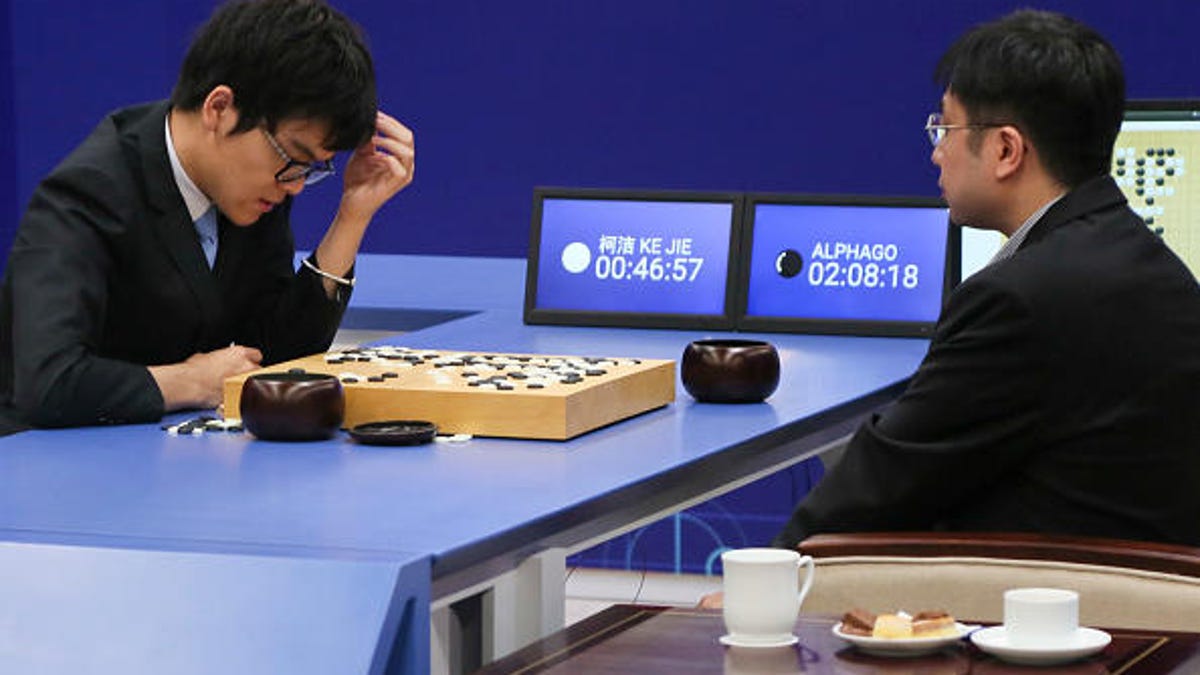Google's AI is no smarter than a 6-year-old, study says
Chinese researchers also found Google’s artificial intelligence technology to be twice as smart as Apple's Siri.

Google's AlphaGo defeated Chinese Go player Ke Jie (left) this year to become the world champion.
Google's AlphaGo may have unseated Ke Jie as the Go world champion this year, but the artificial intelligence behind AlphaGo is actually no smarter than a 6-year-old child.
A study published Saturday showed Google's artificial intelligence technology scored best out of 50 systems that Chinese researchers tested against an AI scale they created, CNBC reported Monday. With a IQ score of 47.28, Google's AI was almost twice as smart as Apple virtual assistant Siri , which scored 23.94.
AI systems have developed so quickly that they've been able to act as assistants, take exams and even outperform us at strategy games. But the new results may downplay the concerns of people uneasy about AI's rapid progression.
To evaluate how smart an intelligent system is (or has become), its ability to "acquire, master, create and feedback knowledge" needs to be tested, wrote the researchers. In 2014, the IQ of 50 AI systems was rated. The systems included Google's AI, Siri and Chinese search engine Baidu. Three humans, ages 18, 12 and 6, were also rated. When the researchers tested the AI systems again in 2016, they found that Google was the smartest and improved the fastest (from an IQ of 26.5 to 47.28), but it wasn't enough to beat even a 6-year-old, who came in with a score of 55.5.
Notable "AI worriers" include physicist Stephen Hawking and Tesla Motors and SpaceX CEO Elon Musk, who both won the 2015 Luddite Award and were branded AI "alarmists." Hawking is a firm believer that AI could pose a real danger depending on who controls it and argues that it could outsmart us and end humanity. Musk agrees there's significant risk and asked for regulation in July, going as far as to suggest AI could start World War III. Alibaba founder and executive chairman, Jack Ma, predicts that companies could be helmed by AI systems in the next three decades.
Dr Lin Hsuan-Tien, chief data scientist of Taiwan-based AI startup, Appier, agrees AI systems have yet to reach the intelligence of even a six-year-old, but possess extraordinary learning capabilities.
"Scientists believed AI was capable of lots of things but were disappointed by failures created out of unrealistic goals," Dr Lin tells CNET in an email.
"Many AI researchers instead started to focus on 'weak AI,' which [tackles] specific problems, such as image recognition or playing the game of Go. Weak AI has proven that its ability to learn surpasses the capabilities of most human beings and is able to achieve super-human performance levels."
Google declined to comment.
First published, Oct. 3, 3:40 a.m. PT.
Update, 11:41 p.m. PT: Adds comment from Appier.
Logging Out: Welcome to the crossroads of online life and the afterlife.
Virtual reality 101: CNET tells you everything you need to know about VR.

